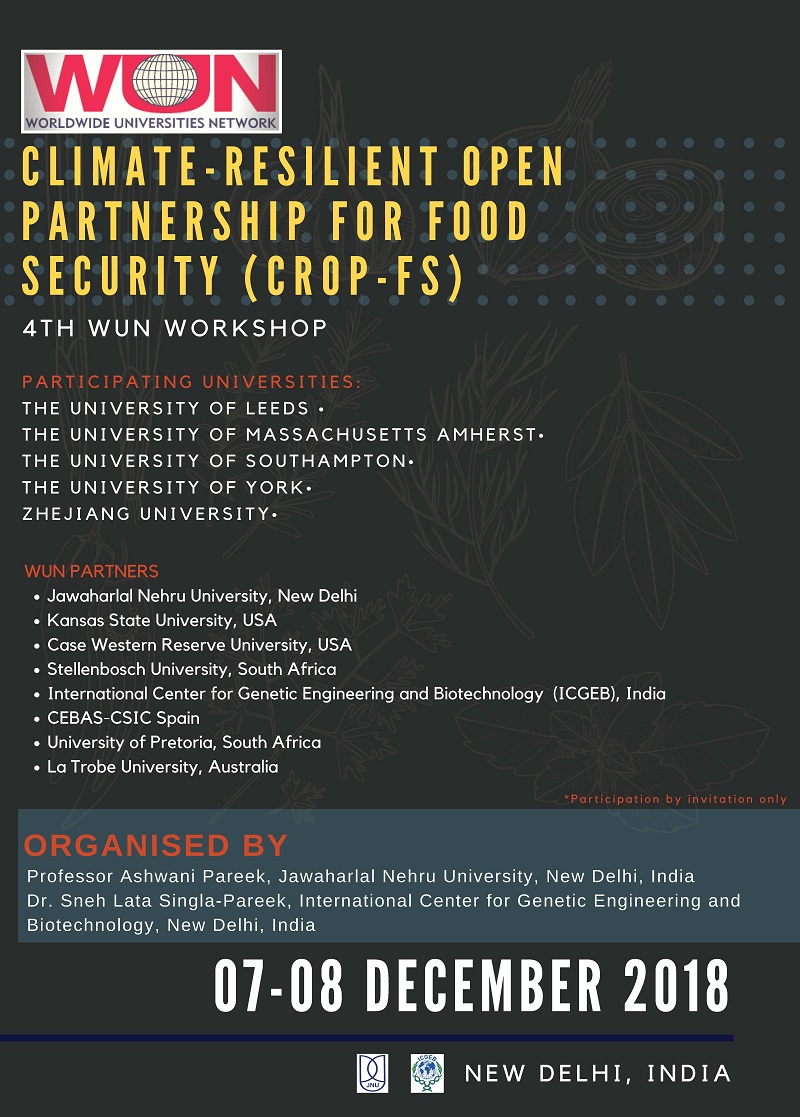
As a result of changing climate, a growing world population risks experiencing more food insecurity. CROP-FS aims to establish an international network of specialists to develop research strategies that will enable major food crops to grow under more extreme environmental conditions such as drought, high temperature, and irrigation with brackish or seawater.
The CROP-FS collaboration was launched in 2016 with agricultural and plant scientists from the University of Massachusetts Amherst in the US, Zhejiang University in China, Jawaharlal Nehru University in India, and the Universities of Leeds, Southampton, and York in the U.K. This “open-partnership” interdisciplinary research group approaches the problem of developing climate-resilient crops using teams working on three specific long-term objectives:
1) Understanding how climate change will affect soil matrix, and how soil amendments such as biochar and other organic matters will improve soil moisture content and carbon sequestration under changing climate. Soil can be a sink for CO2 if properly managed. To mitigate the greenhouse effect, one may apply biochar as an amendment to improve soil quality and crop yield. Through this practice, soil organic carbon content will increase due to the recalcitrant nature of the biochar and soil properties will be improved. Biochar can also reduce N2O emission from soil and can adsorb and reduce the bioavailability and toxicity of soil contaminants, as a result, potentially improve food safety and security.
2) Understanding how the changing climate will affect microbial communities in agricultural soils and their impact on crop yields and strategies to improve rhizosphere activity. Microbial communities are likely to be affected by a changing climate and climate extremes as well as rising levels of atmospheric CO2 and other greenhouse gases (GHGs).They also have the capacity to respond adaptively to these changing conditions more rapidly than plants and animals, potentially affecting resilience of the whole production system. We will study how the structure and functions of these communities are affected by forest and agricultural management practices; how will plant-fungal symbioses (mykorrhizae) become instrumental in crop growth improvements to respond to climate change challenges? The outcome will be the discovery and application of knowledge of microbial processes leading to increased resilience of production systems to climate variability and change, and strategies to improve rhizosphere activity and plant support.
3) Understanding the biochemical and molecular basis of crop adaptation to drought, heat, and heavy metal stresses likely to accompany climate change, and use promising candidate genes/enzymes to improve the ability of plants to produce better yields under changing climate. Plants respond to the environmental stresses at physiological, molecular and biochemical levels by differentially regulating the key gene(s) expression and adjusting their biochemical metabolism. In this objective, we will study the unique molecular and biochemical mechanisms in plants and their response under the extreme environmental conditions using modern biotechnological (metabolomic, proteomic and genomic) approaches. Identified candidate genes and gene networks will be quickly tested in model plant systems so that results can be translated and validated into real crops.
Selected outcomes
Publications
- Food security needs social-science input. Nature (2016)
- Plant, Soil and Environment Special Issue: Climate Resilient Crops (2018)
- Journal of Experimental Botany Special Issue: Mitigating the impact of climate change on plant productivity and ecosystem sustainability (call for papers, 2019)
- Policy Document on Global Food Security
- Climate resilient crops for improving global food security and safety. Plant, Cell & Environment (2018)
Conferences/Workshops
- 1st Workshop at University of Leeds April 2 – 3, 2016
- 2nd Workshop at Zhejiang University (Hangzhou, China) September 20 – 30, 2016
- 3rd Workshop at University of Massachusetts Amherst (USA) October 7 – 8, 2017
- 4th Workshop at Jawaharlal Nehru University (New Delhi, India) December 7 – 8, 2018
- CROP-FS Consortium Outcomes overview presentation
Students, postdocs, and Faculty Exchanges
- Two graduate students and one postdoc visits between UMass Amherst and JNU, New Delhi
- One graduate student visit between Uni. Of Leeds and Uni. Of Stellenbosch
- 6 faculty visits among CROP-FS members’ Laboratories
Joint Supervision of Graduate students
- One PhD and one M.Phil student were jointly supervised by Prof. Om Parkash Dhankher, UMass Amherst and Prof. Ashwani Pareek, JNU, New Delhi. The respective degrees were awarded by the parent institutions.
